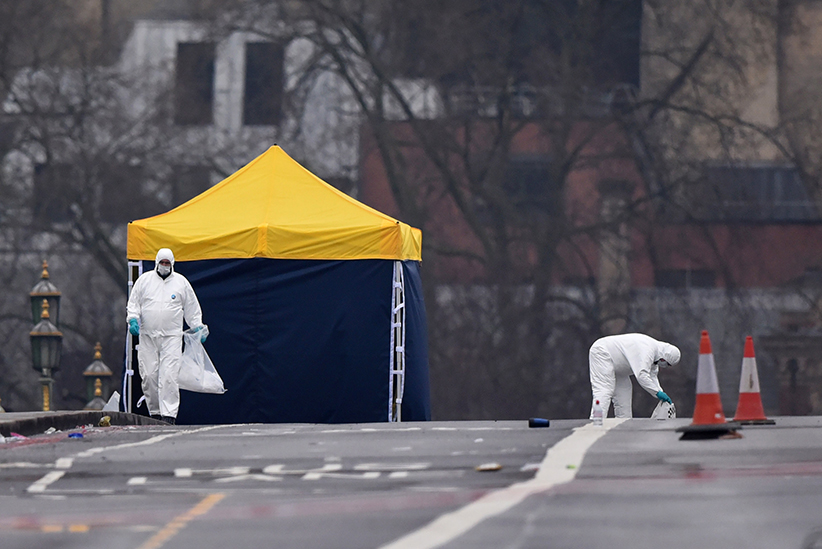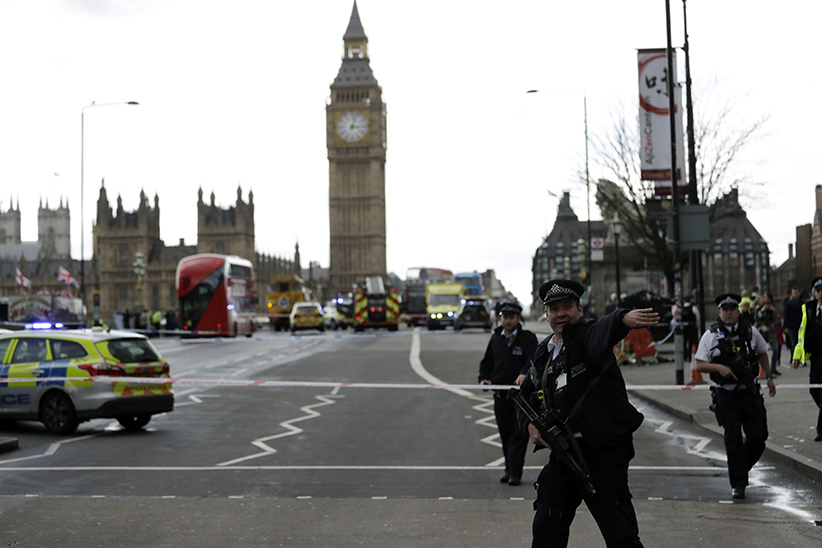London stoically carries on
But a question sits under the surface: How can a city guard against such heinous, yet easily achievable acts?
LONDON, ENGLAND – MARCH 23: Police forensic officers work on Westminster Bridge following yesterday’s attack, on March 23, 2017 in London, England. Four people have been killed and around 40 people injured following yesterday’s attack by the Houses of Parliament in Westminster. (Court/Getty Images)
Share

Ever since the bombings of July 2005, it has been an accepted truth among Londoners that the next serious act of terrorism is not a matter of “if” but “when.”
Yesterday’s attack on Westminster, in which four people were killed and twenty-nine wounded, was the dreaded act of carnage the city has been anticipating for a decade. Superficially speaking, it was a simple, almost ludicrously low-tech plan involving one man, one rental car and two knives. And yet, the damage inflicted was startling.
After chairing an emergency security meeting yesterday, Prime Minister Theresa May declared in a rousing speech that her nation would not be divided or cowed by terrorism.
“These streets of Westminster – home to the world’s oldest Parliament – are engrained with a spirit of freedom that echoes in some of the furthest corners of the globe,” she said. “And the values our Parliament represents – democracy, freedom, human rights, the rule of law – command the admiration and respect of free people everywhere. That is why it is a target for those who reject those values.”
The attacker was later identified as Khalid Masood, 52. Born in Kent and currently residing in an apartment block in Birmingham, Masood is reported to have been “known to police” and had been convicted of violent crimes in the past though he was not currently under investigation for terrorist activities. Earlier, the terrorist group ISIS later claimed responsibility for the attack, saying the suspect was an “Islamic State Soldier.”
Defense Secretary Michael Fallon has called the event a “lone wolf attack.” This despite the fact that police raided a flat in Birmingham overnight and detained eight people who are apparently linked to the perpetrator, who died after being shot yesterday by police.

It’s not yet clear how or why the attack was planned (Masood was also mis-identified briefly by major news outlets yesterday), but the nature of the attack is clear and chilling: Maximum bang for minimum strategy.
It was the same simple technique used by Islamic extremists in recent attacks in Nice and Berlin. In both those cases, terrorists simply drove a motor vehicle into a crowd of innocent people to inflict devastating physical damage. That many of the victims in all three cases were tourists or children or both (a number of the wounded in the London attack were French school children visiting Westminster on a school field trip) seems not to matter to those who commit such random atrocities. The point, one can only assume, is the randomness itself. For in the randomness – the sense that such an attack could happen anywhere, anytime – lies the deep dissemination of public unease. And in this, the attacker has been grimly successful.
While the horror of bombs and guns seems somehow extraordinary – we can all agree that private citizens who go about putting their hands on such obvious instruments of death ought to be monitored closely – the thought of violence being committed with ordinary everyday objects (our cars and kitchen utensils) is in some ways more chilling. How to guard against such heinous, yet easily achievable acts?
As Sam Kiley, the Foreign Affairs editor for Sky News put it yesterday, “Short of ending democracy, of closing access to the democratic process and its trappings, short of delivering strategic effect to lunatics and death cult members, by shutting off the mother of parliaments off from the world, very little more could be done to protect the precinct.
Not, that is, unless the United Kingdom turned itself into something resembling the so-called Islamic State or at the very least a nation so preoccupied with its own security that it has lost touch with what it was that was worth protecting.”
As the details of yesterday’s attack continue to emerge and Londoners march on with their characteristic plodding stoicism, one can at least take comfort in the ever-churning wheels of industry, government and finance in this great historic city. This is hardly the first act of terror to hit the citizens of London. Nor, one sadly suspects, will it be the last.
This post was amended to correct the year of the 7/7 London bombings. They occurred in 2005, not 2007 as previously noted.